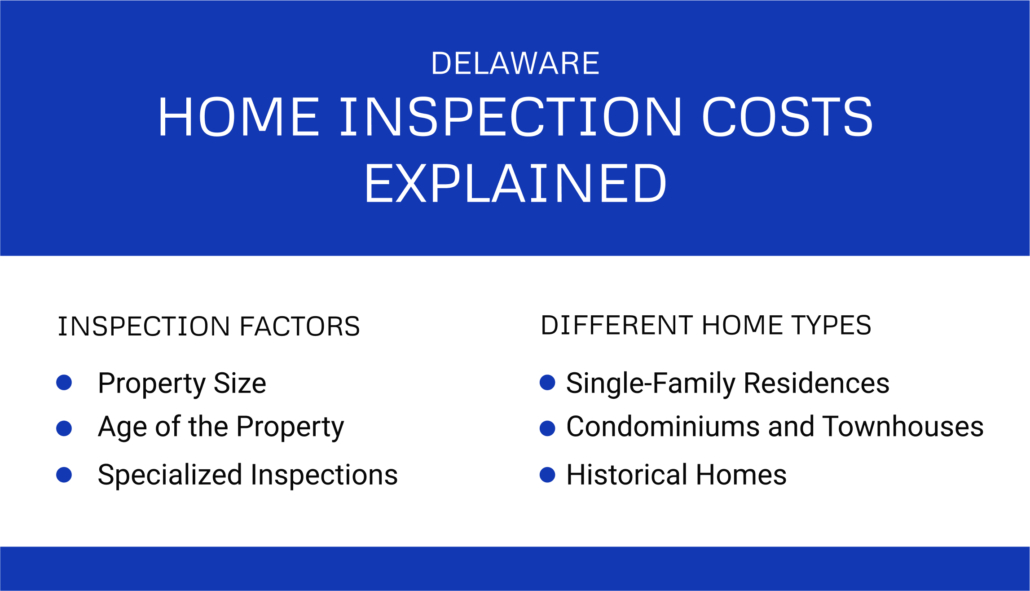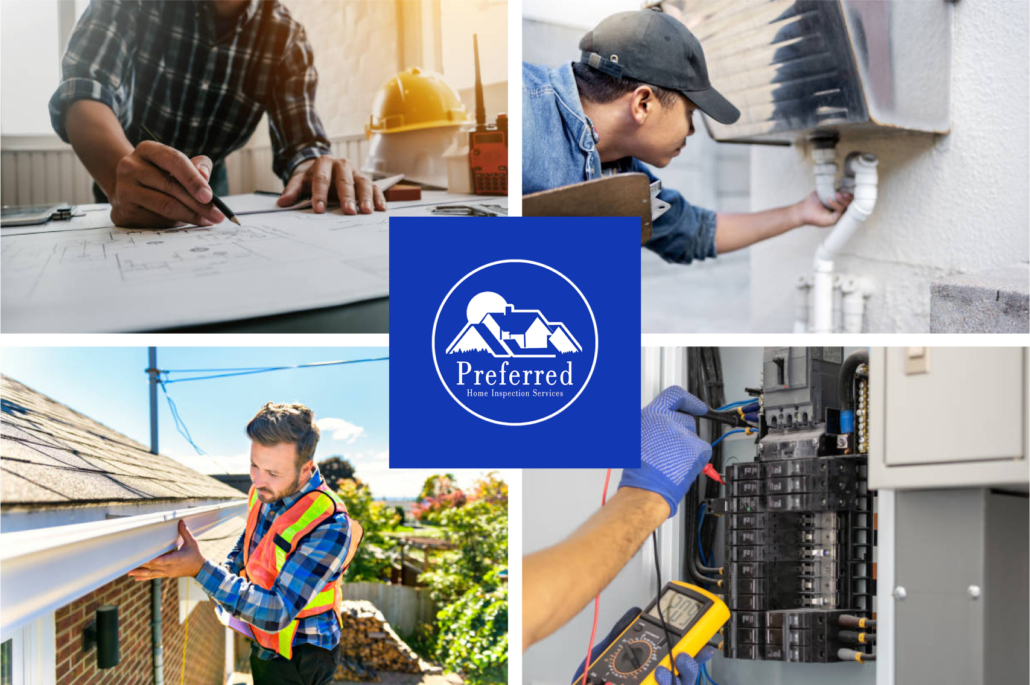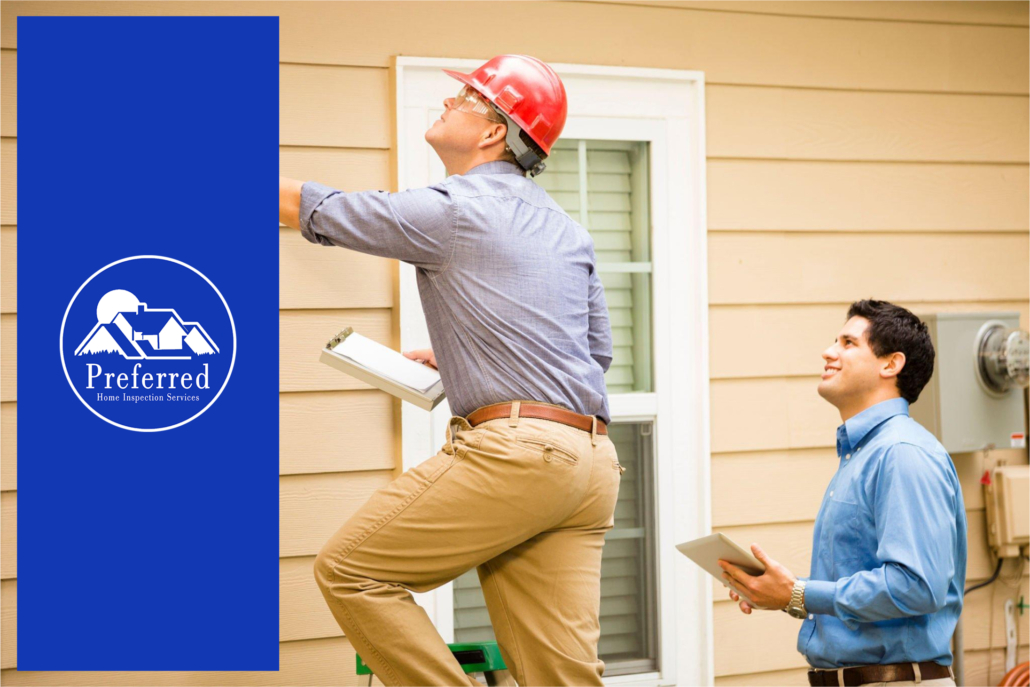Navigating Delaware’s real estate landscape brings challenges, especially when deciphering the costs associated with home inspections. A typical home inspection in Delaware ranges from $543 to $736, though various factors can influence this price bracket.
But what accounts for these variations? As we dive deeper, you’ll uncover the intricacies of home inspection pricing, the components that can escalate costs, and tips to ensure you get the best value for your investment.
Let’s step on this journey of informed decision-making together.

Delaware Home Inspection Costs Explained
Home inspection is not just about glancing at a figure and nodding. It’s about diving deep into what constitutes that price and how various elements can fluctuate the overall cost.
Factors Influencing Home Inspection Costs
Every home and every homeowner’s requirements can be unique, causing the inspection costs to vary.
These are some primary considerations:
- Property Size: Generally, larger homes require more time and diligence during an inspection. It’s about square footage and the number of rooms, stories, and outdoor areas.
- Age of the Property: Vintage charm might hide outdated systems or wear and tear, necessitating more intensive repair costs.
- Specialized Inspections: Termite inspections, mold assessments, or radon testing in Delaware homes are some specialized home inspection services that can add to the overall cost.
Average Range of Costs in Delaware
While several guides shows cost averages, they may not precisely mirror market conditions in Delaware:
- Most homeowners in Delaware spend between $300 to $500 on a standard home inspection.
- For homes larger than 2,500 square feet, the costs could rise to $600 or more.
- Specialized inspections can add $100 to $250 to the bill.
Understanding Price Differences Across Different Home Types
The type of home you’re inspecting also plays a role in the cost determination:
- Single-Family Residences: These are usually straightforward, with costs aligning closely with the above-average figures.
- Condominiums and Townhouses: These properties often have lower inspection costs, primarily if a homeowners association maintains shared components (like roofs or building exteriors) and aren’t part of the individual unit’s inspection.
- Historical Homes: These beauties come with a rich past and potential challenges. Inspecting historic homes, significantly if not last updated ago, can be more labor-intensive and might carry a higher price tag.

Components of a Typical Home Inspection in Delaware
Every home inspection, while following a general pattern, is unique based on the property. Here’s what a standard review in Delaware will encompass:
Foundation and Structural Integrity
The foundation is paramount for the home’s safety. Inspectors will check for cracks, unevenness, and other potential issues affecting the home’s structural integrity.
Plumbing and Electrical Systems
Inspections ensure plumbing is leak-free, has adequate pressure, and that sewage systems work efficiently.
On the other hand, electrical inspections will ensure wiring, outlets, and switches are safe and operational
HVAC, Roofing, and Insulation
- Cool and Warm: The HVAC system will be checked for efficiency, ensuring you’re comfortable in all seasons.
- Overhead Check: A roof assessment ensures no leaks, damaged shingles, or other potential problems.
- Stay Cozy: Insulation will be examined to ensure the home remains energy efficient.
Additional Services and Their Costs
- Radon Testing: This tests for a naturally occurring radioactive gas. It’s a health concern and can add to your inspection costs.
- Termite Inspection: Termites can cause severe damage. Getting an inspection may cost an additional fee, but catching an infestation early can save thousands.

Choosing the Right Home Inspector in Delaware
Your home inspector in Delaware is your guide through this process. So, observe these tips to make a wise decision:
Evaluating Qualifications and Certifications
- Accredited Courses: Ensure the inspector has completed industry-recognized courses or training programs.
- Certification Bodies: Check if they’re certified by reputable organizations like the American Society of Home Inspectors (ASHI) or InterNACHI.
- Continuing Education: A dedicated inspector updates their knowledge to stay current with industry standards.
Reviewing Testimonials and Recommendations
- Online Reviews: Check platforms like website sections, Google, Spectora, or specialized real estate service websites for unbiased feedback.
- References: Contact the inspector for references from past clients for insights.
- Professional Network: Realtors or home contractors can offer recommendations based on their interactions.
Comparing Price vs. Services Offered
- Detailed Breakdown: Request a detailed cost breakdown to understand what’s included and what might be extra.
- Guarantee: Some inspectors offer a service warranty, adding value beyond just the cost.
- Additional Services: Understand if the fee includes any specialized inspections or if those come at an added cost.

Ways to Save on Home Inspection Costs
Bundling Services
- Package Deal: Some inspectors offer packages that combine multiple services, ensuring all aspects of the property are covered.
- Customized Bundles: Tailor the services you need into a bundle instead of choosing a pre-set package.
- Long-Term Partnerships: Consider inspectors who offer long-term service bundles, like annual check-ups, which can save costs in the long run.
Seeking Special Promotions or Discounts
- Group Inspections: Sometimes, neighbors or friends are also in the market. Grouping multiple inspections might attract discounts.
- Loyalty Discounts: If you’ve used the inspector’s services before, or if they were referred by someone they’ve served, there might be a loyalty discount.
- Off-Peak Discounts: Scheduling during the inspector’s less busy times, like weekdays or off-season, can sometimes lead to cost savings.
- Early-Bird Specials: Booking services well in advance can sometimes fetch early-bird rates.
- Referral Discounts: Some inspectors offer referral discounts if a past client referred you.
- First-Time Buyer Discounts: Inspectors might have special rates for those navigating the home-buying process for the first time.
Using Inspection as a Negotiation Tool in Home Buying
- Itemized Reports: Use detailed inspection reports to pinpoint areas that need repair or renovation, strengthening your negotiation stance.
- Estimate Repair Costs: An idea of potential repair costs can help adjust the offer price.
- Include Inspection Clauses: Make sure there’s a clause allowing renegotiation or withdrawal based on inspection findings in your purchase agreement.
Why Avoiding Cheap Services is Crucial
- Value Over Cost: A low-cost service might miss critical issues. An inspection is not the place to cut corners; the potential long-term costs could far outweigh the initial savings.
- Missed Details: Cheaper services might need to be more thorough, leading to missed defects that could be costly down the road.
- Less Experienced Inspectors: Often, a lower cost means the inspector might be less experienced or not as well-trained.
- Potential Bias: Some cheaper services might be aligned with real estate agents or sellers, influencing their inspection results.
- Lack of Modern Equipment: Top-notch inspection often requires specialized equipment. Cheaper services might cut costs by using outdated or less effective tools.
Ensuring Comprehensive Coverage in the Inspection
- Thoroughness is Key: Ensure your chosen inspector offers a comprehensive service, checking all aspects of the property.
- Exterior to Interior: A good inspector will not just focus on the inside but also evaluate the body, including the foundation, roof, and drainage.
- System Checks: Comprehensive inspections will cover all systems, including HVAC, plumbing, and electrical.
- Safety Protocols: Ensure the inspector evaluates the home for safety concerns like mold, radon, and potential fire hazards.
- Detailed Reporting: After the inspection, a comprehensive report with clear photos, explanations, and recommendations should be provided, giving a clear picture of the home’s condition.
Secure Your Dream Home in Delaware Today!
Understanding the ins and outs of home inspections in Delaware is the first step to making a confident purchase. But knowing is just half of the equation. The game-changer is acting on it and partnering with a reliable home inspection professional.
Thus, schedule a top-tier home inspection today and embrace your future with certainty and peace of mind.


